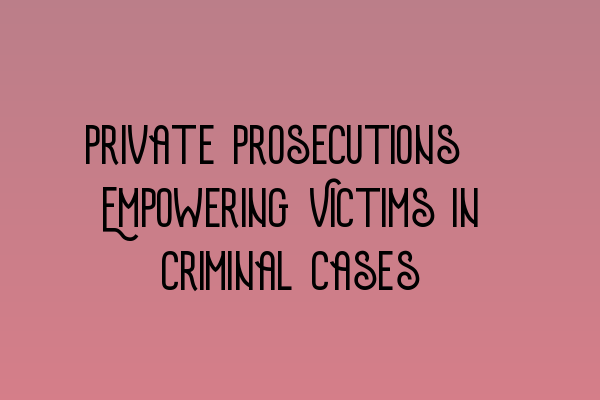Private Prosecutions: Empowering Victims in Criminal Cases
In criminal cases, victims often feel powerless. They may feel that justice is out of their reach or that the legal system does not adequately represent their interests. However, private prosecutions provide an avenue for victims to take control of their own case and seek justice on their own terms.
What are Private Prosecutions?
Private prosecutions are legal actions initiated by individuals or organizations, with the aim of pursuing criminal charges against a defendant. Unlike public prosecutions, which are the responsibility of the state or Crown Prosecution Service, private prosecutions are driven by the victim or a private entity.
Private prosecutions can be used in a wide range of criminal cases, from fraud and theft to assault and harassment. They allow victims to navigate the legal system independently and present their case before a court of law.
The Benefits of Private Prosecutions
Private prosecutions offer several advantages to victims seeking justice:
- Empowerment: Private prosecutions empower victims by giving them control over the legal process. Victims can choose to pursue charges even if the state has decided not to proceed or if previous attempts at justice have been unsuccessful. This enables victims to actively participate in their case and advocate for their rights.
- Flexibility: Private prosecutions allow victims to tailor their legal strategy to their specific needs and circumstances. They can choose their legal representation, gather evidence, and present arguments that focus on their unique perspective. This flexibility ensures that victims’ voices are heard and their interests are effectively represented.
- Restitution: Private prosecutions provide victims with the opportunity to seek restitution for the harm they have suffered. This can include financial compensation, the return of stolen property, or other forms of redress. By pursuing private prosecutions, victims can obtain a sense of closure and hold the defendant accountable for their actions.
Private prosecutions also act as a deterrent, sending a message that individuals or organizations who commit criminal offenses will face legal consequences, regardless of the state’s decision to prosecute.
Challenges and Considerations
While private prosecutions offer unique benefits to victims, there are certain challenges and considerations to keep in mind:
- Cost: Private prosecutions can be costly, as the victim or private entity initiating the action is responsible for funding the legal process. However, there may be options available to help victims with limited financial resources, such as legal aid or third-party funding.
- Expertise: Successfully navigating the legal system requires a comprehensive understanding of criminal law and legal procedures. It is essential for victims to seek professional legal advice or representation from qualified solicitors who specialize in private prosecutions.
- Evidence: Private prosecutions require substantial evidence to support the criminal charges. Victims need to gather and preserve evidence effectively to strengthen their case. This includes witness statements, expert reports, and supporting documentation.
Despite these challenges, private prosecutions offer a way for victims to overcome the barriers they may face in the public prosecution process, ensuring that their interests are properly represented and their voice is heard.
Conclusion
Private prosecutions empower victims to seek justice in criminal cases, providing an avenue for individuals or organizations to pursue criminal charges independently. By taking control of their own case, victims can advocate for their rights, seek restitution, and ensure that the defendant is held accountable.
If you are interested in learning more about the SQE exams and other legal topics, check out our related articles:
